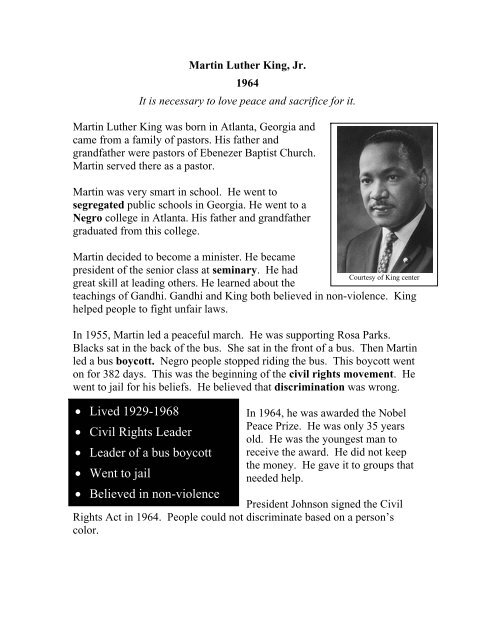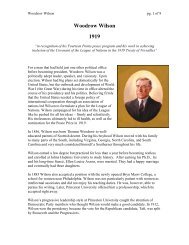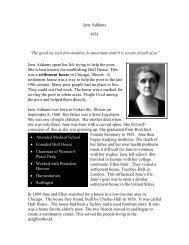Martin Luther King, Jr - The Nobel Peace Laureate Project
Martin Luther King, Jr - The Nobel Peace Laureate Project
Martin Luther King, Jr - The Nobel Peace Laureate Project
You also want an ePaper? Increase the reach of your titles
YUMPU automatically turns print PDFs into web optimized ePapers that Google loves.
• Lived 1929-1968<br />
• Civil Rights Leader<br />
<strong>Martin</strong> <strong>Luther</strong> <strong>King</strong>, <strong>Jr</strong>.<br />
1964<br />
It is necessary to love peace and sacrifice for it.<br />
<strong>Martin</strong> <strong>Luther</strong> <strong>King</strong> was born in Atlanta, Georgia and<br />
came from a family of pastors. His father and<br />
grandfather were pastors of Ebenezer Baptist Church.<br />
<strong>Martin</strong> served there as a pastor.<br />
<strong>Martin</strong> was very smart in school. He went to<br />
segregated public schools in Georgia. He went to a<br />
Negro college in Atlanta. His father and grandfather<br />
graduated from this college.<br />
<strong>Martin</strong> decided to become a minister. He became<br />
president of the senior class at seminary. He had<br />
Courtesy of <strong>King</strong> center<br />
great skill at leading others. He learned about the<br />
teachings of Gandhi. Gandhi and <strong>King</strong> both believed in non-violence. <strong>King</strong><br />
helped people to fight unfair laws.<br />
In 1955, <strong>Martin</strong> led a peaceful march. He was supporting Rosa Parks.<br />
Blacks sat in the back of the bus. She sat in the front of a bus. <strong>The</strong>n <strong>Martin</strong><br />
led a bus boycott. Negro people stopped riding the bus. This boycott went<br />
on for 382 days. This was the beginning of the civil rights movement. He<br />
went to jail for his beliefs. He believed that discrimination was wrong.<br />
• Leader of a bus boycott<br />
• Went to jail<br />
• Believed in non-violence<br />
In 1964, he was awarded the <strong>Nobel</strong><br />
<strong>Peace</strong> Prize. He was only 35 years<br />
old. He was the youngest man to<br />
receive the award. He did not keep<br />
the money. He gave it to groups that<br />
needed help.<br />
President Johnson signed the Civil<br />
Rights Act in 1964. People could not discriminate based on a person’s<br />
color.
<strong>Martin</strong> was killed on April 4, 1968 in Memphis, Tennessee. He helped<br />
garbage workers on strike. As a nation, we now celebrate <strong>Martin</strong>’s birthday.<br />
We remember how hard he worked for everyone.
Student Activities<br />
Talk about this quote from <strong>King</strong>:<br />
“Darkness cannot drive out darkness; only light can do that. Hate cannot<br />
drive out hate; only love can do that.”<br />
Discussion Questions<br />
1. Why do we celebrate <strong>Martin</strong> <strong>Luther</strong> <strong>King</strong>’s birthday in the United States<br />
2. What did <strong>Martin</strong> <strong>Luther</strong> <strong>King</strong> believe<br />
3. Give examples of <strong>Martin</strong> <strong>Luther</strong> <strong>King</strong>’s teachings about equality at your<br />
school<br />
4. Have you ever stood up for someone who was being treated unfairly<br />
What did you do<br />
5. Do you think our country can ever rise to <strong>Martin</strong> <strong>Luther</strong> <strong>King</strong>’s wish that<br />
we treat all people equally Give examples of your answer.<br />
Vocabulary<br />
1. Discrimination<br />
2. Negro<br />
3. Segregated<br />
4. Seminary<br />
5. Boycott<br />
6. Civil Rights Movement<br />
Student Activities<br />
1. Class Pledge<br />
As a class, make a circle. Hold hands and say the <strong>Martin</strong> <strong>Luther</strong> <strong>King</strong><br />
pledge:<br />
Loving, Not Hating<br />
Showing understanding, not anger<br />
Making <strong>Peace</strong>, not war<br />
We are all one.
2. Writing Activity<br />
Make a promise statement on paper as a class or individually about what you<br />
will do to promote rights of all students.<br />
Example:<br />
I live by <strong>Martin</strong> <strong>Luther</strong> <strong>King</strong>’s beliefs that all people should be treated as<br />
equals. <strong>The</strong>refore, I promise to:<br />
Art<br />
Trace your hand on heavy paper. Cut out the hand and put one promise on<br />
each finger.<br />
Do collages from magazines of people solving conflicts or acting peacefully.<br />
Conflict Resolution and Role Play:<br />
Talk about ways to deal with conflict:<br />
Passive, aggressive, assertive: Your teacher may practice the assertive way<br />
with a student partner, then let students practice in pairs or come up in front<br />
of the class.<br />
Situations to role play.<br />
A friend was supposed to come over to play and they didn’t show up.<br />
Someone cuts in front of you in line.<br />
You feel left out on the playground.<br />
Read Together<br />
and J. Pinkney<br />
Happy Birthday, <strong>Martin</strong> <strong>Luther</strong> <strong>King</strong> by Jean Marzallo
and Mike Gordon<br />
<strong>Martin</strong> <strong>Luther</strong> <strong>King</strong>, <strong>Jr</strong>. Day by Margaret McNamara<br />
<strong>King</strong><br />
My Life with <strong>Martin</strong> <strong>Luther</strong> <strong>King</strong>, <strong>Jr</strong>. by Coretta Scott<br />
Technology Option:<br />
Listen to the I Have A Dream Speech. Discuss two ideas from the speech.<br />
How do you think you would have felt being there when this speech was<br />
given Do you think people changed how they lived after this speech<br />
Resources<br />
http://www.thekingcenter.org/ Speeches, biography, educational activities<br />
from the <strong>King</strong> Center in Atlanta<br />
http://www.kingian.net/ Site for teens on non-violence and the ideas of<br />
<strong>Martin</strong> <strong>Luther</strong> <strong>King</strong> <strong>Jr</strong><br />
http://www.brainyquote.com/quotes/authors/m/martin_luther_king_jr.html<br />
Quotes from <strong>King</strong> Speeches<br />
http://nobelprize.org/nobel_prizes/peace/laureates/ <strong>Nobel</strong> site for <strong>Peace</strong><br />
<strong>Laureate</strong>s
Selected Bibliography<br />
Adams, Russell, Great Negroes Past and Present, pp. 106-107. Chicago,<br />
Afro-Am Publishing Co., 1963.<br />
Bennett, Lerone, <strong>Jr</strong>., What Manner of Man: A Biography of <strong>Martin</strong> <strong>Luther</strong><br />
<strong>King</strong>, <strong>Jr</strong>. Chicago, and Johnson, 1964.<br />
I Have a Dream: <strong>The</strong> Story of <strong>Martin</strong> <strong>Luther</strong> <strong>King</strong> in Text and Pictures. New<br />
York, Time Life Books, 1968.<br />
<strong>King</strong>, <strong>Martin</strong> <strong>Luther</strong>, <strong>Jr</strong>., <strong>The</strong> Measure of a Man. Philadelphia. <strong>The</strong> Christian<br />
Education Press, 1959. Two devotional addresses.<br />
<strong>King</strong>, <strong>Martin</strong> <strong>Luther</strong>, <strong>Jr</strong>., Strength to Love. New York, Harper & Row, 1963.<br />
Sixteen sermons and one essay entitled "Pilgrimage to Nonviolence."<br />
<strong>King</strong>, <strong>Martin</strong> <strong>Luther</strong>, <strong>Jr</strong>., Stride toward Freedom: <strong>The</strong> Montgomery Story.<br />
New York, Harper, 1958.<br />
<strong>King</strong>, <strong>Martin</strong> <strong>Luther</strong>, <strong>Jr</strong>., <strong>The</strong> Trumpet of Conscience. New York, Harper &<br />
Row, 1968.<br />
<strong>King</strong>, <strong>Martin</strong> <strong>Luther</strong>, <strong>Jr</strong>., Where Do We Go from Here: Chaos or<br />
Community New York, Harper & Row, 1967.<br />
<strong>King</strong>, <strong>Martin</strong> <strong>Luther</strong>, <strong>Jr</strong>., Why We Can't Wait. New York, Harper & Row,<br />
1963.<br />
"Man of the Year", Time, 83 (January 3, 1964) 13-16; 25-27.<br />
"<strong>Martin</strong> <strong>Luther</strong> <strong>King</strong>, <strong>Jr</strong>.", in Current Biography Yearbook 1965, ed. by<br />
Charles Moritz, pp. 220-223. New York, H.W. Wilson.<br />
Reddick, Lawrence D., Crusader without Violence: A Biography of <strong>Martin</strong><br />
<strong>Luther</strong> <strong>King</strong>, <strong>Jr</strong>. New York, Harper, 1959.<br />
From <strong>Nobel</strong> Lectures, <strong>Peace</strong> 1951-1970, Editor Frederick W. Haberman,<br />
Elsevier Publishing Company, Amsterdam, 1972






